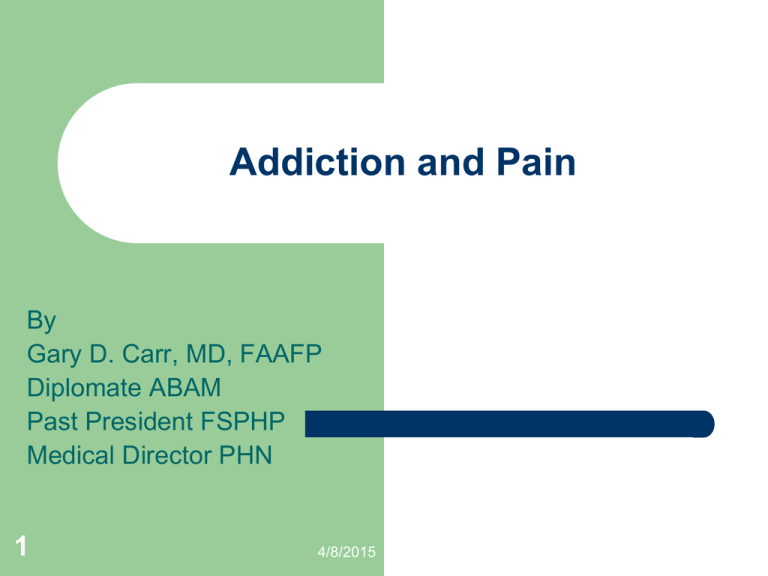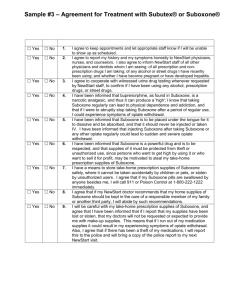Addiction and Pain
advertisement

Addiction and Pain By Gary D. Carr, MD, FAAFP Diplomate ABAM Past President FSPHP Medical Director PHN 1 4/8/2015 Case One 2 John is a 28 YO WM followed at FP Office with usual illnesses. Fall from ladder at home with Compression FX L-3 and severe L Ankle FX. Back treated with brace. Ankle had ORIF with “good result”. Continued pain – both sites. Occ. Swelling L Ankle. Early analgesics – Oxycontin 40mg BID & Lortab 10 QID PRN Now 1 year S/P accident and still requiring Lortab 10 up to TID. No other apparent Problems… Without meds says pain prevents his concentrating, can’t sit still for over 30 min, and interferes with sleep. Seems inappropriately irritated over my attempts to cut back or D/C Lortab 4/8/2015 What Do You Think? What Do You want to Know? 3 4/8/2015 More History 4 No significant medical illnesses No other routine meds Works as Assistant VP of a Local Bank Married to RN. 2 children 2 and 4 YO No known family history of addictive illness. He does not know father’s side of family. Denies problems at work or home. 4/8/2015 More History 5 Casual conversation with a friend resulted in disclosure that Patient was reportedly intoxicated at time of his accident. (Reporter did not know of relationship with LMD and Patient) What do you want to know? 4/8/2015 More History 6 Patient admits he had “a little too much to drink” when he had accident. Denies drinking to this extent except on rare occasions. Admits “A couple” beers at night. Wife confirms his story. Reserved. Non-narcotic substitutions for pain: NSAIDS – GI upset venlafaxine and duloxetine – Both caused “Nightmares” and “Detached Feeling” PT – “Seemed to make pain worse” F/U with Orthopedist – Doesn’t think he should still 4/8/2015 be requiring Lortab… Revelation 7 Wife comes in crying. Says that she lied about ETOH. Drinking “too much” every day. Didn’t tell LMD because he “promised to stop” and “he would have been furious”. “I believed he needed it for his pain control”. Her visit is prompted by the fact she’s learned he is getting Lortab on the internet. Appears he is really taking about 18 – 20 /day. She also saw a bill from a pain management clinic in a neighboring state What now??? 4/8/2015 Intervention/Treatment 8 Successful intervention conducted. Had 1 month IP and 3 months IOP. Continued problems with Lumbago at night managed without narcotics Contract with LMD including agreement to avoid all mood altering substances including alcohol. Urine Drug screens. Appears committed to recovery Active in AA/NA Things better at home 4/8/2015 Setback 9 6 months sober – Jet Sky accident. Recurrent back pain, Neck Sprain, Fractured wrist… Non-Narcotic meds not working. What can we do for him?? NOTE: Just because he is an addict, we don’t want him to suffer. Yet, we do not want to prompt relapse. 4/8/2015 Acute pain treatment 10 Treated with: NSAID, Skelaxin, and Cymbalta (tolerated this time), and physical therapy. Pain persisted. Given Suboxone SL 8 mg 1 – 2 per day with good pain control. Wife administered. Tapered and D/Ced after three weeks without difficulty Was this appropriate therapy? Was it appropriate for the wife to administer? What are the risks? What were other alternatives? 4/8/2015 Follow Up 11 John is now sober over 2 years. Active member of AA, has sponsor, works steps, chairs meetings, has first sponsee Wife doing OK but won’t go to Alanon So far, so good. 4/8/2015 Case Two Frank is a 48 YO WM followed with Ankalosing Spondylitis, Recurrent Major Depression and Anxiety – anxiety predominates He is a single high school teacher Has Rheumatologist Has been on multiple non-narcotic pain Rxs. Over past 4 years Rheumatology has been giving Lortab up to 100/ month – more typically about 30 / month Functioning at work. No overt sign of impairment Is this appropriate RX Management to this point? 12 4/8/2015 More History Anxiety with Depression managed predominately with SSRIs and combination Serotonin and norepinephrine with variable success. Worsening complaints of pain when anxiety/depression active. Has refused past attempts to have him see therapist Occasionally requests Xanax (alprazolam) which has been provided intermittently at dose of .5 mg ½ tid and 1 at HS. Recently requesting more Xanax and running out a few days early. One report of “lost prescription on vacation”. Is this concerning? 13 4/8/2015 Indicator of Trouble? 14 Fired by Rheumatologist because he had gotten an RX of Lortab via ER and did not tell Rheumatologist. Had signed a pain control contract with Rheumatologist. Seemed surprised this was “such a big deal”. Denies trying to hide this from anyone. Irritable/defensive affect F Hx: Patients father had a history of “needing a lot of prescription pain medication for his stomach”. Died in MVA at age 55. What do you do? 4/8/2015 More Problems 15 LMD talked Rheumatologist into resuming care 3 months latter Rheumatology discovered another RX for Lortab from another primary care doc. LMD calls local pharmacies and discovers 5 different providers of Lortab on near monthly basis Taking up to 12 – 18 per day. What do you do? 4/8/2015 Intervention Intervention conducted. Admits a problem. Initially blamed Rheumatologist and LMD saying we failed to adequately manage his pain Does not have financial resources for treatment (and probably not the motivation). And leaving work “will mean the loss of my job”. What do you do? 16 4/8/2015 Patient Management Patient refuses AA/NA. Does not think he has a problem. Thinks he took Lortab over inadequately treated pain and Anxiety Willing to take Suboxone Willing to see a therapist Willing to execute contract with LMD What will you do? 17 4/8/2015 Patient Management Sent to a therapist familiar with addictive illness, depressive illness and anxiety D/O. Contract – 1) Meds from one Pharmacy and one provider. 2) Regular urine drug screens 3) Suboxone 8 mg SL TID “for pain” 4) SSRIs for Anxiety and Depression 5) Must see individual therapist regularly Discussion… 18 4/8/2015 Initial Resistance Initially, Frank delayed seeing therapist Requested increase in Suboxone beyond 4 / day Was angry, depressed, had insomnia, and ranked his pain as 7/10. Shortly after he started seeing a therapist, his complaints decreased Duloxetine 60mg (Cymbalta) and Amitriptyline 100mg were clinically helpful for pain, depression and insomnia. Why would a therapist be beneficial for Frank? NOTE: I believe Frank would be happier and do even better with his Anxiety/Depression if he were doing 12 step work. 19 4/8/2015 Follow Up Patient followed under contract now for 1.5 years. No escalation with Suboxone (3/day) No Benzodiazepenes Sees therapist regularly – looks forward to it It is noted that increased pain increases his depression and vice versa Urines negative for unauthorized drugs of abuse or ETOH Enjoys making bird houses for sale in his wood working shop Stable if not “happy, joyous, and free” Discussion… 20 4/8/2015 Case Three 21 Angela is a 66 YO WF, Married with 2 grown children. Her husband is a supervisor at a local factory Angela has been in recovery from Opioid Dependency and Alcoholism for 14 years and is very active in her recovery process. Angela’s husband is not involved in recovery 4/8/2015 More History 22 Angela developed a breast lump. Her last mammogram had been 5 years ago and she had not kept F/U apts for her female exams. She was diagnosed with Breast CA Metastatic to the skeletal system with lesions in her Lumbar Spine, Femur, and Ribs. She was treated with Radiation treatments. Refused Chemo. She has intractable pain. What are the pain management considerations/options? 4/8/2015 More History 23 Suboxone was tried for pain relief. This caused “H/As” and she did not like “how it makes me feel”. Her Oncologist suggests Fentanyl Patches with Percocet 7.5 for breakthrough pain. Is this appropriate management? Should it matter that her disease is a terminal illness? 4/8/2015 Angela’s Management 24 Angela was given Fentanyl Patches 50mcg which she tolerated well. She takes occasional Percocet 7.5 but says these do cause some drug craving She uses one pharmacy and her LMD does all Rxing. She is able to make her AA meetings most weeks. When unable, her AA friends bring a meeting to her home. She dislikes having to take pain medications and for some time struggled with this meaning she had “lost sobriety”. She remains lucid, engaged in life, and reasonably happy – she attributes her positive mental attitude to her recovery Individual therapy has been offered but she feels like her needs are met in AA. Discussion… 4/8/2015 Contact Me 25 Gary D. Carr, MD., FAAFP, Diplomate ABAM 5192 Old Hwy 11, Suite 1 Hattiesburg, MS, 39402 Office: 601-261-9899 Cell: 601-297-6777 E-Mail: Docgcarr@aol.com Web: www.professionalshealthnetwork.com 4/8/2015










